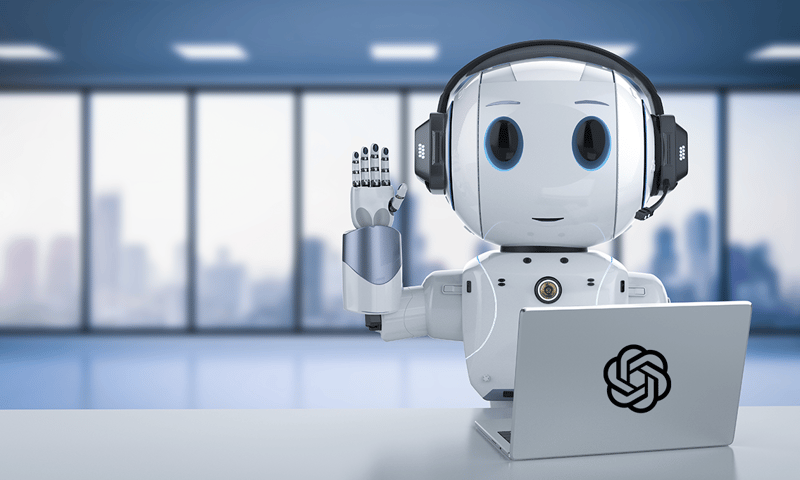3 min read
ChatGPT for accountants: Your AI overlords call for your tribute
Artificial Intelligence (AI) such as ChatGPT is transforming various industries and the accounting profession is no exception. The integration of AI technology into the accounting world is bringing about numerous benefits, including increased efficiency, accuracy, and speed in the performance of various accounting tasks. In this blog, we will explore the ways in which AI is changing the accounting profession and its future prospects. And learn a little about ChatGPT for accountants.

Increased Efficiency
One of the most significant benefits of AI in the accounting profession is increased efficiency. AI technology can automate routine and repetitive tasks, freeing up accountants' time to focus on more important and complex tasks. This increased efficiency not only saves time but also reduces the risk of errors that can occur in manual processes.
For example, AI-powered accounting software can automatically categorize transactions and match invoices with purchase orders, reducing the time and effort required for manual reconciliation. This software can also perform bank reconciliation and generate financial statements, freeing up accountants to focus on more strategic tasks, such as analyzing financial data to inform business decisions.

Improved Accuracy
AI technology can also improve the accuracy of financial information by detecting errors and inconsistencies in real-time. For example, AI-powered software can check for missing or incorrect information in invoices, transactions, and other financial documents, reducing the risk of incorrect or incomplete financial reporting. Additionally, AI algorithms can identify patterns and trends in financial data that may be difficult for human accountants to detect.

Increased Speed
In addition to increased efficiency and improved accuracy, AI technology is also helping to speed up the accounting process. AI algorithms can process large amounts of financial data quickly, providing real-time financial information to decision-makers. This helps businesses to make informed decisions faster, improving overall financial performance.
For example, AI-powered software can quickly analyze large amounts of financial data to identify potential risks and opportunities, allowing accountants to proactively address issues before they become a problem. This increased speed also helps businesses to respond more quickly to changes in the market, making them more agile and competitive.

Integration of AI into the Accounting Curriculum
The integration of AI into the accounting profession is also driving changes in the education and training of accountants. As AI technology continues to evolve, it is essential that accountants are equipped with the necessary skills to work with and integrate AI into their work.
To this end, many universities and colleges are integrating AI into their accounting curriculums, providing students with hands-on experience in using AI technology and developing AI-powered accounting solutions. This training will help ensure that future accountants are equipped with the skills needed to work effectively in an AI-powered accounting environment.

Challenges and Opportunities
While AI technology is transforming the accounting profession, there are also challenges and opportunities that must be considered. One of the biggest challenges is the potential for job displacement as AI technology becomes more prevalent. Some accounting tasks, such as data entry and reconciliation, are becoming increasingly automated, reducing the need for human accountants in these areas.
However, it's important to note that AI technology is also creating new job opportunities in the accounting profession. For example, AI technology requires accountants with specialized skills in data analysis, AI integration, and software development. As AI technology continues to evolve, the demand for these skills will only increase.
Another challenge is the potential for AI to introduce bias into the accounting process. For example, AI algorithms may make decisions based on past data and patterns, leading to unequal treatment of different groups. It is essential that accountants ensure that AI technology is used in an ethical and unbiased manner, avoiding any unintended consequences.

Conclusion
In conclusion, the integration of AI technology into the accounting profession is bringing about numerous benefits, including increased efficiency, improved accuracy, and increased speed in the performance of various accounting tasks. As AI technology continues to evolve, it is important for accountants to develop the necessary skills to work effectively in an AI-powered environment. While there are challenges and opportunities to consider, such as job displacement and the potential for bias, the integration of AI technology into the accounting profession is an exciting and transformative development that has the potential to significantly improve the performance of the accounting industry.
So tell us — did you have any idea the above was written by AI? It’s true. With the exception of a few small additions to help make sure the blog shows up in searches, ChatGPT wrote the entire post above this paragraph.
Far from being a threat to writers of all kinds, ChatGPT instead offers options when time is short, or when there isn’t a professional writer on staff. Like AI in general, it can make life simpler. And that’s exactly what Botkeeper does for bookkeeping. Our AI works hand-in-hand with accountants to create time, efficiency, resource availability, accuracy, and value. But don’t take some lowly human’s word for it. Check it out for yourself!





